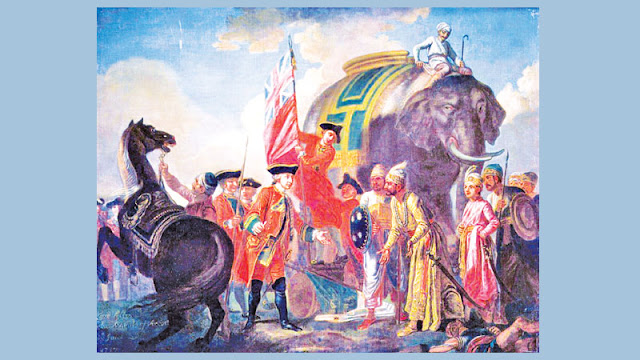After the death of Aurangzeb, the disintegration of the Mughal Empire was rapid. Delhi, the seat of power of the Mughals, gave way to Bengal as the centre of political importance in India. It can be ascertained from the fact that the British win over Siraj ud Daula in the Battle of Plassey in 1757, which took place just 50 years after death of Aurangzeb, laid the foundation of the British Empire in India. During the period, Bengal was ruled by the Nawabs with their capital at Murshidabad. Though nominally governors or viceroys of the Mughals, the Nawabs were independent heads of state for all practical purposes.
Siraj ud Daula became the Nawab of Bengal after the death of his grandfather Alivardi Khan who died in 1756. He was the son of latter's youngest daughter. This was not liked by his near relations including his mother’s eldest sister, Ghasiti Begum, and his cousin Shaukat Jung who went all length to conspire against him. In addition Siraj ud Daula found in Mir Jafar, the Commander-in-Chief of the army, a formidable enemy.
Though inexperienced and lacking decision making power, Siraj-ud-Daulah became successful in overcoming these challenges by killing Shaukat Jung in October 1756. Ghasiti Begum was rendered powerless by the confiscation of her wealth. Mir Jafar was replaced by Mir Madan as the commander of the army.
Siraj ud Daula, the then Nawab of Bengal, resented to the interference by the East India Company in his province. He was also livid with the company’s abuse of the commercial privileges which was granted by the Mughal emperor Farrukhsiyar under the firman of 1717.
The ‘Black Hole’ was a tragic incident that happened in the run-up to the Battle of Plassey. The incident served as casus belli for the invasion by the British on Murshidabad.
With the worsening of the relations between the Bengal Nawab and the English, the latter hatched a conspiracy with Mir Jafar. The battle of Plassey was fought on 23 June 1757, resulting in the defeat of Siraj-ud-Daulah who fled from the battlefield. He was, however, captured and put to death by the orders of Miran, the son of Mir Jafar who was now made the Nawab of Bengal.

Comments
Post a Comment